Amy C. Fitzjohn's Blog, page 22
August 9, 2018
Don’t Give Up! – A Guest Post
 Sometimes, we all have the urge to give up on a task or a goal, especially when it feels like we’re getting nowhere or it isn’t going the way we expected.
Sometimes, we all have the urge to give up on a task or a goal, especially when it feels like we’re getting nowhere or it isn’t going the way we expected.
My theme for August is ‘Get It Done’ – I’m determined to cross a few writing projects off my list that have been hanging around for too long!
The enthusiasm of my intern over the past few weeks – Cristiana Noaptes – has certainly motivated me to keep going. To do more. Be more.
Being responsible for someone else in my business has certainly inspired me this summer, and Cristiana has been inspired to write this article.

Amy & Cristiana – Team Learn To Love Your Words, summer 18
Still a student and English is not her first language – until she joined me Cristiana had never published her writing like this, but her bravery and determination to learn and succeed have left me feeling privileged to share her words with my readers.
Here are her top tips to never give up on your goals and dreams.
Over the Cristiana…
DON’T GIVE UP, BECAUSE…
Is it really easy to achieve our goals?
To make our deeper dreams real?
I won’t try to convince you, we all know it’s not always easy, and not fast at all.
But is this a good reason to give up? No, it’s not.
Let me give you some tips about how you could face up to your dreams and fears.
DO A BIT DAILY
If your journey to happiness seems still far away, try to make it become closer doing some little steps every day that will allow you to achieve your purpose.

You must start slowly, and be doing little things every day won’t make you feel bored or tired for all the effort you have already done.
Start without rushing, and don’t be scared if the results you’re looking for won’t appear as magic in the first few days.

MAKE IT BECOME A ROUTINE
You’re trying to do something special, different, that in some way is changing your life.
Great, you should be proud!
But don’t think like that.
If you’ll start acting and then thinking you’re great for having done something new, once you’ll stop you’ll feel very disappointed with yourself, and it will be very easy for you to give up, thinking that you’ve already stopped after only two days of new lifestyle.
Do the opposite! Take it easy.
Look at your new actions as a simple routine that makes you feel comfortable, and don’t punish yourself if it’s not enough. You’ll have another chance tomorrow to do more.
Feel satisfied knowing it’s already part of your daily life!
DON’T GIVE UP BECAUSE…
It’s going to be hard and stressful, but every time you’ll think to give up, start thinking about why you want to do it, why you want to achieve that goal.
If you already started it must mean something for you.
If you’re already halfway why give up now?
You can do it! And to do it, you must convince yourself first of all!
Our brain is our best weapon, to convince us, and also to let us down, so let’s use it in the right manner!
PLAN YOUR DAYS
Are you worried about all the commitments you have to do, and how to make them work if you have so many?
Write down what you have to do and when.
It’ll help you to organize your engagements and to avoid all the stress and bother trying to remember what you were supposed to do and if you’ve done it!
You could try writing everything on a journal or if you think it’s easier putting all your events on your phone calendar, so every day you’ll receive a message with all the things you’re supposed to do.

GO TO THE BOTTOM
As already said, don’t give up while you’re halfway. You’ll just keep asking yourself how it could’ve ended, if you would have been happy by achieving your goal, how would you feel, and so on…
Don’t give up until it’s done! Try to be brave, and curious, don’t you want to enjoy your own little wins?
You’ll feel so proud of yourself!
You’ll feel like you could do anything! And that’s exactly the truth!
You’re human, and you can do whatever flows through your mind if you really want it with all your heart!
“Start something new again and keep proving to yourself that you’re absolutely talented!”
START A NEW CHALLENGE
The best way to prove to yourself you can do whatever you want is to keep busy with new challenges that mean something for you. Once you achieve one of your goals you’ll be more ambitious and confident that you can really do whatever you want.
So start something new again and keep proving to yourself that you’re absolutely talented!
Some lovely motivational lessons from Cristiana, wise beyond her years!
It’s been a great pleasure having her work with me over the past few weeks.
For instant updates when I publish a new blog post, Follow me on Bloglovin’
For extra goodies and exclusive new information, join my mailing list HERE.
The post Don’t Give Up! – A Guest Post appeared first on Amy Morse.
August 6, 2018
5 Simple Steps To Be A Likeable Business – A Guest Post
 How likeable are you and your business?
How likeable are you and your business?
Working for yourself can be lonely.
On the one hand, it’s motivating knowing you are in control, that you can do it in exactly the way you want to. You don’t need to compromise with your colleagues, you don’t need to rely on others in a team to complete their share of the work so a project can move forward.
On the other, when it’s just you in your business, you spend an awful lot of time in your own head.
To quote from my recent post on the Three Lessons I’ve Learned From Three Years In Business, “We all have both positive and negative internal monologues, and some days, the Devil shouts the loudest!”
So, having an intern come to work alongside me in the business has been a steep learning curve!
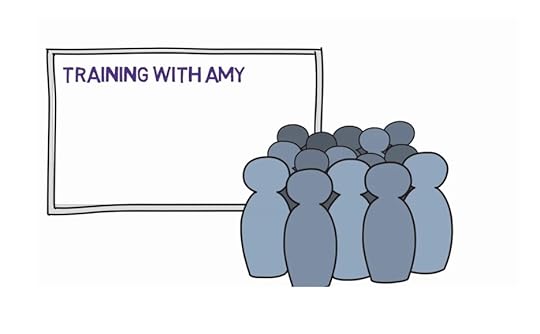
Having an intern working with me has been a learning experience for both of us!
I’ve linked ‘Learn To Love Your Words’ with UK Intern Development this summer and I’ve had two interns working with me.
The second of my interns, Cristiana Noaptes, would like her own travel blog one day, so I encouraged her to try her had at writing a blog for me.

Amy Morse and Cristiana Noaptes – The Learn To Love Your Words Summer 2018 Team!
I often talk about using your blog to help people to get to know, like and trust you and your business and here’s Cristiana’s take on 5 steps to help people to like you and your business.
5 Steps To Be A Likeable Business
1 Create Connections → have conversations
2 Be Transparent
3 Be Authentic
4 Think Digital
5 Quality, Not Quantity

CREATE CONNECTIONS
Everybody can have a conversation, but not everyone can create connections the first time they talk with someone new.
So, don’t just talk about your businesses. First of all, try to find a connection point for both of you, something you like and that will help you to become friends.
A little tip: let the other person speak, pay attention to what he’s saying and ask him about his hobbies!
Remember to chat with everybody and don’t judge them by their cover, because you never know what or who they know.
Everyday is a good day to learn something new from someone else!
BE TRANSPARENT
If you want to be successful, you need a lot of contacts, this means plenty of friends that can connect you with other people when you need it.
To create connections you must be honest with people about who you really are, what you do and about your interests, even if it’s the first time you meet them and you’re not already sure you like them.
The more details you give them, the more they’ll love you! Just treat them like old friends who need a refresher about your life.
That’s how they’ll start to trust you.
BE AUTHENTIC
Anybody could sell cars, but not everybody knows how to sell a Lamborghini Veneno to someone who really needs a family car!
Show people that you’re good at what you do. Showing them your knowledge and adding value.
We’re all different people with various skills, you must understand which are your strengths and use them when you deal with your customers.
So find your way to do your job, don’t try to copy your colleagues or your friends. The way you do your work has to be completely yours, different from your colleagues.
Try to find your signature, by being yourself and people will love you!
THINK DIGITAL
We live in 2018, with 7 billion people on Earth and too many struggles nowadays, so how can you trust people at first sight? Well, probably you can’t and you won’t.
But there are ways to research people using social media!
Social media is a great way to find out more about people you have just met, or people you’re going to meet. And if you can do it, anyone else can do the same. So be prepared, be online, and be honest with people on the web about who you are and your passions. Don’t try to mimic someone you’d like to be, there are no best versions of yourself if not yourself.
IT’S ABOUT QUALITY, NOT QUANTITY
Do you ever question why teengers take pictures of everything and post it on the web in the next second?
Probably you did, and you’re probably right.
The point is, teens know how to use social media, and they use it as a hobby, so don’t pay too much attention at what they’re spreading.
Instead of them, if you want to use these tools properly you must learn how to use them and to share the right content for your business, using keywords to identify your trade.
Using a social media to spread your knowledge and to publicize yourself could mean a big step for your business.
For instant updates when I publish a new blog post, Follow me on Bloglovin’
For extra goodies and exclusive new information, join my mailing list HERE.
I only send a newsletter monthly so I won’t spam you, I promise!
The post 5 Simple Steps To Be A Likeable Business – A Guest Post appeared first on Amy Morse.
Sunday Reboot: Plan Your Proactive Week
We all know that having a plan is a sensible idea when you work for yourself. It’s the proactive thing to do.

Whether it’s a plan for the overall strategy of the business, a plan for your marketing or a plan for your blogging.
The point is to break down those big goals we set for ourselves into baby steps. Actions we can take on a daily, weekly, monthly, quarterly, yearly basis.
Yet, so often we’re resistant to the confines of a ‘plan’ – after all, nothing ever goes according to plan, right? So, what’s the point of having one?

Without a plan, you are trapped in the endless cycle of reacting to challenges. Instead of making positive strides towards what you really want to be doing with your time.
You need at least some vague plan, otherwise, how will you know where you are going and when you’ve arrived?
What proactive steps do you take if you don’t know which direction to take them in?
There is always so much to do when we work for ourselves. There are never enough hours in the day. So, it’s up to you to decide how best to use those precious hours…
The most common myth for not blogging is not having the time.
I say it’s a myth, because, “I don’t have time” can be applied to absolutely any activity…
“I don’t have time to go to the gym”
“I don’t have time to prepare a sensible meal”
“I don’t have time to update my website”
“I don’t have time to go on holiday”
“I don’t have time to (fill in the blank)”
Unless you prioritise something, how will you make the time to do it? And if you are not proactive enough to have a plan, how will you find that time?
There is so much information out there on managing our time effectively.
My friend, and the brilliant transformative coach, Sarah Clark of Mariposa Coaching, has shared 8 Time Management Strategies HERE.
We had a little Twitter chat about it, but the first tip she offers resonated with me.
To Quote:
“1) Make a plan for the week prioritised against goals
We all hear about planning using to do lists right? You can’t think about time management without being aware that a to do list is crucial to make baby steps towards your goals.
The key is to link your to do list to longer term goals that you want to achieve.
Think about how you might feel in ten years time from now, looking back on what makes those last ten years productive and happy?
What would you be doing each week to take small steps to move towards this?
It would of course involve breaking goals down into smaller steps but having this mindset can help us see the bigger picture and keep motivated.
It is important to ensure that they are the goals that you want to achieve and not someone elses and that you prioritise your week against these goals.”
Sarah’s blog is just one great piece of content on the topic.
This is my take on a technique you could try, to be more proactive, so you can make the time you need to write your blog.
The Sunday Reboot
This has become something of a ritual for me.
Sunday afternoons, I’ll spend a while thinking about the week I’ve just had and my week ahead. Sunday is my day of the week to reflect on the previous week and prepare myself physically and psychologically for what’s coming up next week.
I can plan in some enjoyable activities, as well as my priorities, to create better balance – after all, one of the main reasons to be self-employed is to have a better work/life balance!
Your life is your work, rather than work becoming your life!
On my Sunday reboot, I ask myself:
What do I want to achieve?
What can I realistically achieve in the space of a working week (i.e. 5 days)?
Is there one BIG thing that would be great to nail this week?
Is there a BIG thing I want to finish this month that I need make progress on?
Are there things I’m NOT prepared to do this week?
Is there something that HAS to happen this week?
The ‘To Do’ list is endless, aiming to clear it in a week is simply unrealistic – what’s on the list that CAN get finished this week?
Break down a big item on the To Do list into smaller tasks
Are there any partial tasks I can do? i.e. rather than having ‘finish the Blogging Book’ on the agenda, have ‘complete the next chapter of the Blogging Book,’ instead
What is coming up in the next few weeks I need to prepare for? Are there any tasks for the list there?
Choose 5 things from the list and allocate a day for each. This can be something you WILL do today, and anything else you do after it is a bonus!

Next, I write the tasks in my diary or day book.
Every day I tick off tasks as I complete them, but I also have a daily ‘done list’.
In my ‘Day to View diary’ I write everything I do in a day and tick it off as a ‘done list’ – that way, even if I don’t do all the things on my list for the week I can see how I’ve been proactive instead.
This helps me to see how much I can do in a day so that for next Sunday’s reboot I have a better sense of what ‘realistic’ actually means!
It also allows me to celebrate all the little wins in my week!

As I look ahead beyond the next week, into the next month, I plan in the occasional ‘Retreat Day‘.
These are days where I knuckle down and focus on one big task for the day – usually banking lots of raw written content for blogs, marketing, products etc.
I make time to write, and I honour it. I’ll do some sort of proactive ‘writing-related activity’ every day. And make sure I add it to the done list!
A Proactive ‘Writing Related Activity’ could be:
Thinking about ideas
Researching ideas
Consuming and curating other content to inform my ideas and research
Planning blogs and other writing
Drafting written content in notebooks and capturing ideas
Setting up blogs in WordPress and drafting ideas
Going into old drafts and adding to them or updating them
Editing old or draft content
Completing drafts and publishing or scheduling them
Regularly rebooting on a Sunday – it may be a different day for you, depending on how your working week is structured – quickly becomes a habit. That habit then becomes a ritual.
Starting the week fresh, with a clear idea of what I need to do, stops me procrastinating and helps me to focus.
I don’t think of this approach as a ‘plan’ – I think of it as being proactive.
I celebrate the little successes and I don’t beat myself up for not doing ‘enough’, because I’ve set myself some sensible baby steps from the outset.
For instant updates when I publish a new blog post, Follow me on Bloglovin’
For extra goodies and exclusive new information, join my mailing list HERE.
I only send a newsletter monthly, so I won’t spam you, I promise!
The post Sunday Reboot: Plan Your Proactive Week appeared first on Amy Morse.
August 1, 2018
Optimizing Your Google My Business – A Guest Post
Writing great content on your website is only the first step. Publishing it is not a case of ‘write it and they will come’, you need to give your business a fighting chance on Google for people to find it.
It’s in Google’s best interests to make sure its users always get the most relevant and optimized responses to their search queries. If Google showed you things you weren’t interested in, you’d use another search engine!
It means Google has a range of simple tools – that even digitally-stunted people like me can use – to help your website be found by the people interested in what you have to say.
Ultimately, Google is not your customer, so being at the top of the search list is not necessarily a good thing if it’s not optimized, otherwise you’ll be filtering out spam and irrelevant business enquires. The better you know your customer, the better tailored your website will be for them and tools like Google My Business will help them find you.

I’m still learning more about Google’s tools myself and how to use them to help the people I want to help, so when Nicole Allen got in touch and offered to write a guest post about Google My Business, I knew I could learn a thing or two, and hopefully, you will to!
Over to Nicole…
Properly Optimizing Your Google My Business

Google has proven to be the master of search engines. For the sake of your business, it is crucial that you understand the importance of Google My Business ranking higher in search results.
First and foremost, you need to verify your Google My Business listing for all your business locations. This is to ensure that your business comes up in google search results thus giving you an edge over your competitors who haven’t used SEO optimization tactics.
Google gives preferential treatment to its own current and accurate business listings when showing local results to its search users. Therefore, you should always make sure that your Google My Business listings are complete, up-to-date, and accurate.
In recent times, Google has incorporated various features aimed at promoting your business and providing additional information to target customers. Once you learn how to maximize on these resources, your business will see increased visibility on the internet and much-needed exposure to potential customers.
The following are ways to optimize your Google My Business.
Accurate Information
Google expects your business name on Google My Business the way it’s known to your customers and as it appears on your shopfront. In all your listings, make sure you enter the correct business name, phone, and address.
Google does not allow the following additions to your business name:
Special characters
URLs
Location
Taglines
In addition, you cannot use toll-free call center numbers. Instead, you should put down your local telephone number for all your locations. Your business name, phone number, and address should also be consistent and accurate throughout the web including on Google My Business. By managing and constantly monitoring your business listings you will be able to avoid such small mistakes.
Customer Reviews
Find ways and means to encourage your customers to click the “Write a Review” page on your Google My Business. The truth is, the higher the number of positive reviews on your business page, the higher your business will rank in the local search results. The success of your business on Google really depends on positive customer reviews.
In May, Google started sending notifications to customers to inform them of any response to their business reviews. This has seen more and more consumers motivated to view the responses. In retrospect, it makes the experience more enriching and interactive for customers who take their time to write the reviews. The customers feel valued and appreciated by the business.
The review responses, according to Google, will be instantly available on the Google Search and Maps.
Business Hours
Pay attention to your business hours. Whether it’s seasonal or permanent, ensure your business hours are regularly and appropriately updated on your business listing. If Google Maps believes that you have already closed or you are about to close, they will ask customers if they still want to visit your location despite being closed or just about to. Proper SEO is vital. Do not lose your customers simply because you haven’t put up the correct and up-to-date operating hours.
Remember to update your acceptable payment options as well if at all they have changed. It will make it easier for your customers to know how to pay for your services and products.
Descriptions
You need to optimize the descriptions of your Google My Business. How? By providing content that accurately describes the nature of your business and what it’s all about. This is what sets you apart from your competition.
You have only 750 characters to give a concise description of your business. It’s best you make the most out of it. Remember, Google doesn’t permit links in this section.
Here’s how to make your description count in optimizing your Google My Business listing.
Maximize on the keywords although avoid overstuffing.
If the categories and business name do not adequately describe the services and products your business provides, this is a good opportunity for you to include services and product description.
If you are in a congested market, include what sets your business apart from the rest.
Use local lingo and ties to attract local customers.
It would be beneficial for you to adhere to these basic guidelines before returning the descriptions for Google My Business.
Provide honest, precise, useful and relevant information about your business and the kind of services or products you provide. Avoid beating around the bush.
Your content should not:
Showcase sub-standard and irrelevant content. For instance, misspelled words.
Focus on offers, discounts, prices, and promotions.
Be inappropriate or offensive.
Mislead the users in any way, shape or form. Don’t provide false information about your business, service or product offering.
Nicole is a freelance writer and educator based in Michigan and believes that her writing is an extension of her career as a tutor since they both encourage learning and discussing new things. When she isn’t writing, you might find Nicole running, hiking, or swimming. She’s participated in several 10K races and hopes to compete in a marathon one day.
Thanks, Nicole for these great tips!
I’m always open to considering submissions for guest and sponsored content on the blog.
I do, however, get a lot of requests and owe it to my readers only to publish genuinely useful content that is well written and relevant to them.
My submission guidelines are simple:

Read about what makes a good pitch HERE.
I ask $40/£30 (Via PayPal) for a ‘DoFollow’ link and to cover the cost of my time.
Guest contributors, on the other hand, I consider on a case by case basis, for a fair exchange, or if I have invited the guest to contribute.
For instant updates when I publish a new blog post, Follow me on Bloglovin’
For extra goodies and exclusive new information, join my mailing list HERE.
The post Optimizing Your Google My Business – A Guest Post appeared first on Amy Morse.
July 13, 2018
Three Lessons From Three Years In Business
 July marks the third year I’ve been in business.
July marks the third year I’ve been in business.

Each year, I meet my anniversary with mixed feelings.

Firstly, I’m always glad, relieved, happy to have made it through another year.
My chief measure of success is not giving up and not having to get a ‘proper job’!
When the Enterprise Agency I was working for closed in 2015, and my world as a Business Advisor and Author collided, I vowed I would never work for someone else again.
 There’s a phrase on my ‘Vision Board’ that always stands out for me:
There’s a phrase on my ‘Vision Board’ that always stands out for me:
“A true entrepreneur doesn’t have a plan B”
Secondly, it’s always a period of reflection for me. Which is both a positive and negative experience.
Invariably, I go through a confidence wobble at this time of year.
That whiny little voice in the back of my skull pipes up with her negative nit-picking – “Ni, Ni, Ni…”
Telling me…”Ni…”
“You cocked that up!”
“Ni, what do you know?”
“Who would want to work with you?”
“Ni, that person over there knows so much more than you, it’s embarrassing. Aren’t you embarassed?”
“You’d have earned more this week if you were on benefits!”
“You? Mentoring other startups at BRAVE? Who are you to give lessons to another business?”
“Ni, you’re bloody lucky to have made it this far.”
“Sooner or later you’ll have to give up this business charade. Everyone knows you’re just a blagger.”
It’s why my webinar on Bloggers Compare Despair was an especially poignant one…
We’re all fallible. No-one is perfect and we all have doubts and fears.
We all have both positive and negative internal monologues, and some days, the Devil shouts the loudest!
Talking about our challenges in our businesses, better still, writing about them in your blogs, is a very cathartic!
Writing is my go-to therapy to get all those “Ni’s” out of my system!
It also shows your vulnerabilities, gives people a glimpse of the authentic you, the human behind the business.
Three Lessons
Whenever I go through those bouts of doubt, I like to remind myself of the three lessons I’ve learned over the course of my three years in business.
Here are my three lessons. They are my sword, shield and spear against the “Ni”!
1) Trust in the process
When you publish a blog, someone will read it. Sometimes it feels like shouting into the wind and our voices are being pulled out to sea, but rest assured, someone will always read your words. They may not comment. They may not share, but trust that you have an impact, on some level, to someone.
Keep going.
Keeping writing.
Keep doing small things every day.
Take small regular steps and you’ll get there. Honestly, have a little faith in yourself, you will get there!
2) Things always take longer than you expect
Content marketing is a long-term game. It’s not a quick fix. It takes time to charge people’s trust batteries. You can’t just zap them with one blog and expect them to be a loyal customer for life.
It’s a slow burn.
It’s not just about the destination, find ways to enjoy the journey.
Take pride in small victories. Find joy in little moments. If the journey gives you pleasure, the destination loses its significance. In fact, the jourey becomes the destination! (Which is very pleasing, because you can always remind youself that you are already there!)
3) It will always be up and down, don’t fret
Accept the things you cannot change or control.
Be comfortable in the knowledge that it may get uncomfortable.
You will have off days. Failures. Days where all you hear is the Devil. Times when you just want to give up. Puke-inducing moments when you make a complete tit of yourself!
That, my friends, it’s a little thing called ‘Life’!
Besdies, if it was all simple and plain sailing, that would be a really boring story, wouldn’t it?
For instant updates when I publish a new blog post, Follow me on Bloglovin’
For extra goodies and exclusive new information, join my mailing list HERE.
I only send a newsletter monthly, so I won’t spam you, I promise!
The post Three Lessons From Three Years In Business appeared first on Amy Morse.
July 10, 2018
Massive List of Reasons to Blog For Your Business
 I responded to a Facebook comment recently; an entrepreneur I know asked what the benefits of blogging were.
I responded to a Facebook comment recently; an entrepreneur I know asked what the benefits of blogging were.
After a small, exasperated, internal scream – I started this post…
Writing about something is my go-to response!
There are so many reasons to blog…
That’s just one reason to blog – ‘to get things out of your system’…
I’ve written many times on the benefits of blogging for your business, but I thought it was about time I wrote this list of reasons.
This is a biggy, folks, so sit back and get comfortable!
Please feel free to add to it in the comments if you have any other ideas:
Amy Queen of Blogs’s
Massive List of Reasons
Blogging Can Benefit Your Business
1) Get it out of your system
Blogging is a great way of publicly and unequivocally making a point you are passionate about. It’s OK to be controversial too!
2) Cathartic
It feels good to say it, to feel heard and share your voice with the world.
3) Finding Your Voice
I received the greatest compliment recently. A perfect stranger greeting me like an old friend because, despite us having never met, she felt she knew me from reading my blogs. She recognised my voice in my writing.
4) Authenticity
Showing a little of yourself. Showing your vulnerability. Telling your story. These all help to build up an authentic picture of you and your business. People will get to know, like and trust you by what you say online.
5) Google friendliness
Blogging is the biggest thing, by a country mile, you can do yourself to boost your findability on Google. This is one of the top reasons to blog, but blogging is not an exercise in creating the internet!
By blogging regularly, you keep your website active – otherwise, be honest, it would probably stay static. You are also filling your website with all the juicy ‘Keywords’ Google needs to find content. In other words, the things people type into search engines like Google to find content. Your blogs will naturally include these words if you write with your audience in mind.

6) Continuous Professional Development
Working for yourself is a constant learning curve. Too often we neglect our own personal and professional development. Blogging is a great way to push your boundaries, learn new skills and communicate articulately.
7) Researching your audience
Use your blogs to share ideas, reasons behind decisions, to test content on your audience and use the analytics to learn who is reading your blogs and why you appeal to them. It’s a great way to start to build up an accurate profile of who your ideal customers are.
8) Experiment with variety
I’m a writer, so my go-to communication choice is writing.
I like written blogs and help my clients to write well for their business, however, blogs can also be Vlogs (Video Blogs).
They can be long, short. Stories. Poems. Pictures. Graphics. Audio/Podcasts. We all consume information and learn in different ways and variety will help you find what works for your style and what your audience enjoys. Experiment. But always have your content on your website. If you rely on someone elses platform you lose control of it and it’s difficult to convert.
9) Intellectual Property
You created it, you own it. It’s your ‘Intellectual Property‘ which has an intrinsic value.
10) Creating Information Products
Information has value and your blog is a great place to start. I’ve turned blogs into books, talks, workshops… Get creative with your intellectual property!
11) Express your opinion
It’s OK to be controversial sometimes. Very few of us set out to deliberately upset others but no business has succeeded by trying to please everyone. Share the reasons why you hold particular beliefs. It’s OK to disagree with people and can be a powerful platform to really make a difference to something through the work of your business.
12) Share and Stand by your values
As above, if you have values behind your business, don’t be afraid to express them.

Stand for something! Become an authority on the subject. Be an ambassador for a particular point of view. Help others to understand the reasons behind why you do what you do.
13) Open Up
The fewer boundaries you have, the deeper connection you will make with the people that want to be part of your world. Share a little of your vulnerability and you’ll win over the hearts and the minds of your customers.
14) Express Yourself
Self-expression is a powerful and freeing thing. Embrace it!
15) Show Your Style
Blogging is one of the simplest ways demonstrate your style, expertise and share knowledge. Your brand is more than just a logo, it should reflect your personality and style. Your blogs build up this picture over time.
16) Authenticity
Be yourself! Show your personality. Allow readers to look behind the scenes of your business so they can get to know, like and trust you.
17) Improve Your Writing
The more you write, the better you will get at it. However, there is only so much improvement you can do with practice alone. You need Feedback...
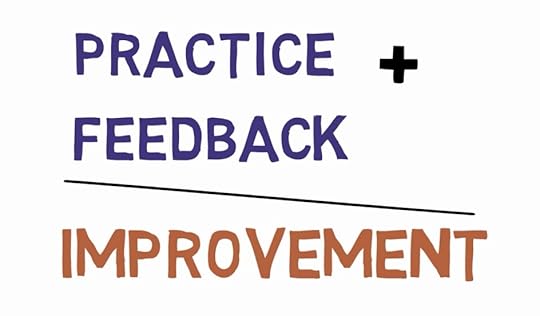 18) Get Feedback
18) Get FeedbackReaders will soon tell you if they like or dislike what you’ve written, and some will also point out your mistakes (surprisingly useful, once you get over the embarrassment!).
19) Social Media
You never run out of things to say on Social Media if you blog! You will always have your own content to share.
20) Give People Something to Share
Make sure you have social sharing buttons on your individual blogs that allow people to share your content.
Your blog fans become an extension of your marketing team and will propagate your content for you by sharing and resharing across their networks.
21) Something You Can Share
When I’m talking to potential clients and contacts, I’m often asked the same things. If I can answer people’s questions by simply sharing blog links with them, we can get straight to the nitty-gritty of what they really need help with and I waste less time repeating myself!
22) Soundbites
Writing your own blogs means you often write your own little nuggets and soundbites. You can pull out these quotes and use them in other areas of your business. Add those snappy soundbites to your leaflets, create quote images to share, spruce up your website copy. Re-use your own words shamelessly and repeat your messages so they are memorable.
I wrote in a message to a client once “Just call me Amy, Queen Of Blogs…” – I’ve since adopted it as a hashtag and I love being talked about as the ‘Queen Of Blogs’. It all helps to boost my profile as the go-to blogging mentor for businesses.
23) Focus
Develop healthy habits such as; discipline, commitment and focus. You can process ideas, organise thoughts and concentrate on your priorities.
24) Improve Your Writing
Being able to communicate effectively in writing is a key skill in business and in our digitally connected world. It can impact so many parts of our lives.

25) Accountability
By writing in a public forum you are making a commitment to do something. If you say you’re working on something on your blog, you feel a responsibility to actually do it and not get distracted. My first blog was driven by the need to be accountable while I finished and published my books.
26) Showcase Someone Else
It’s a lovely thing to host someone else on your blog. It saves you having to write content for that ‘episode’, it builds relationships with others and it allows you to increase your reach by accessing other people’s networks.
It can be a bit of legwork to get people to do it, however, and sometimes you may have to chase people. Don’t rely on it for your schedule, think of them as bonus content.
27) Find Your Niche
You can do all the desk research in the world, but eventually, you just have to give it a go. Experimentation and measurement are a great way to find your niche.
28) Discover Your Creativity
Many of us believe we are not creative. This is fundamentally untrue. We are all creative in some way. You started your own business, how much more creative can you get?
Creativity isn’t just about the ability to draw, or sing, or write. Creativity is essentially just problem-solving. And a business is there to solve a problem. Some of us have a more analytical approach or ‘are better with numbers’ but that does not mean you aren’t creative. You are just creative in other ways. However, once you get into the writing habit, you might just surprise yourself! You’ll unlock that inner creative spirit that you left behind with your childhood!
29) Research, Just For The Joy Of It
Writing a blog gives you reasons to research different topics. Research something that fascinates you, and your blog is a perfect vehicle to share your findings.
30) Better Research Skills
By researching information for your blogs you will also develop your own researching skills. You can be a more systematic and organised researcher and Pinterest is a great (and little known) tool to curate your research.
31) Meeting New People
Blogging allows you to meet new people in the real and virtual world. There are communities of bloggers out there all ready to support each other.
32) Get Noticed
…For the right reasons! Be noticed as an expert and an influencer in your field. With thousands of new websites created every day it’s easy to get lost in the noise. Blogging keeps your web presence regular and consistent and gives visitors something valuable to read when they get there. Ultimately, that all helps to sell your products/services.
33) Money
As you grow your blogs over time, it can pay for the time you spend on it through affiliate links, adverts, paid downloads, eBooks and sponsorship, etc.
I’m regularly approached by businesses willing to pay me to host them on my blogs so they can link back to my website and get a Google-Boost!
34) Conversions
The only way you will ‘convert’ likes and follows into business is to entice people into your virtual shop, so you can collect their contact information or they can get in touch with you directly.
35) Conversations
Creating talking points. Responding to comments, shares and likes are all opportunities to open up a dialogue, start conversations and build relationships.
36) Inspire and Influence
It’s rewarding to know that you have made an impact, that in some small way, you have made a difference to someone by giving them the information and help they need.
Of all these reasons, the ability to make a difference to someone is one of the most important for me.
37) Being Concise
 (However, the irony is not lost on me that this is possibly one of the longest blogs I’ve ever written!)
(However, the irony is not lost on me that this is possibly one of the longest blogs I’ve ever written!)
38) See The Person Behind The Business
We all want to see the human side of a business. It helps us to relate to it and builds up our trust

39) Personal Journaling
Related to the cathartic reasons for blogging, journaling is a lovely way to track our own progress and share our struggles and successes and…
40) …Be Heard
We want to feel that we have been heard. It’s good for the soul!
41) Therapeutic
Being heard. Telling our story. These are all therapeutic reasons to blog

42) Educational
Perhaps you need to educate your audience in the use of your product or service? Or educate people so they appreciate the need for what you do?
A series of blogs is a great way to help people along their journey towards buying!

43) Celebrate Successes
Your blogs can be a great way to celebrate things that have gone well in your business. It all helps to raise your profile and grow your brand and status.

44) Something to Include in Other Marketing
Blogs make great newsletter content! People will only open and read an email if it’s helpful and not too salesy!
45) Something to Give
Develop a reputation for being generous with your knowledge and that generosity will be revisited on you. Think of it as a Business Karma!

46) A Taster
If you have ever been to a food festival or farmers market, you’ll know that the stalls with the free samples are the ones that are the most popular! Your blog allows you an opportunity to give away free samples of your service, your knowledge or your products so people can ‘try before they buy’.
47) Progress Tracking
You can look back on your old blogs as your business grows and see how far you’ve come!
48) Demonstrate Your Expertise
Grow your influence in your sector by demonstrating your expertise in your niche through your writing.
49) Tell Your Story
Your story can move, motivate, influence and inspire others. Tell it. Tell it your way and in your own words!
50) Instant Gratification
It’s quick, it’s instant. You can set your words loose into the wild, right now, today. That can be very motivating!
51) Your Own Magazine
Ever fancied writing your own magazine? Well, your blog is your chance to do exactly that. You get to be the editor of your own online magazine and reach out to your inner journalist!
52) It’s Fun
Last, and by no means least, my favourite of all the reasons to blog. Simply for the sheer pleasure of it, because blogging is fun!
Am I missing anything?
What are your favourite reasons for blogging?
For instant updates when I publish a new blog post, Follow me on Bloglovin’
For extra goodies and exclusive new information, join my mailing list HERE.
I only send a newsletter monthly so I won’t spam you, I promise!
The post Massive List of Reasons to Blog For Your Business appeared first on Amy Morse.
July 3, 2018
How Niche Is Too Niche? Part Two: How and When to Define Your Niche
Do you have a niche in your business? Should you have?
This is part two of a two-part blog. In part one I shared 3 big compelling reasons to care about having a niche.
Before you write anything, you need to know who’s reading it, so you can adapt the content and language accordingly. But this carries through to all parts of your business, because, after all, blogging for your business is a fundamental tool in your marketing toolbox.

I posed two questions at the end of that blog and a quick activity.
The questions were:
How and when do you decide on your niche?
Should you have a niche from day one in your business?
I wish I had a magic wand and could give you that answer! But the truth is, you need to discover this for yourself in your own business and sometimes the only way you can do this is through trial and error.

Here’s two tips to help you decide on your niche:
1) Your Story Has More Than One Character
I like to think of customers as the heroes in the story of your business, and you can have more than one!
If you have different services for different client groups, have a couple of ‘characters’, but keep in mind, whoever they are – in a demographic sense – they will all share a similar mindset to be attracted to you and your business.
When making these decisions, businesses often get stuck in the superficial (age, social grouping, location etc.) – you need to go much deeper into their personalities, values, ethics and aspirations. Find common ground between all your ‘characters’ and focus on that as your ‘niche’.
For some help navigating your way through this process, talk to me about a Skills Sessions with the ‘Create Your Customers’ online workshop.
The online workshop takes you through 7 short, animated instructional videos, breaking down activities into quick, manageable tasks. Downloadables, checklists, a quiz and a half-hour Q&A session with me over Skype/Zoom. The materials are downloadable, so you can work offline, and you’ll get lifetime access to them. Together, we can plot out your characters.
Once you have your cast of characters, test it out.
Use the information in all of your marketing communications, split test and measure the successes, and failures, with each character. This will help you refine it down to the core ‘stars of the story’ – in other words, your niche!

2) Who do you WANT to work with and who do you NOT want to work with?
It’s your business, you get to make these decisions.
Don’t be frightened to say “no” to people (trust me, it’s very liberating!).
Don’t be afraid to change what you do, eliminate services and products that don’t serve you and your business – if it’s not working, or it’s attracting the wrong kinds of people, stop offering it.
I used to have a package where clients could pay a monthly subscription and I’d critique their writing. I had two clients, one paid by direct debit and hardly used it – after a while, I hated taking money from them and we cancelled it. The other client sent me stuff sporadically, all times of day and any day of the week, expecting it done the same day, then didn’t pay me for months on end. In both cases, someone was losing out in the relationship.
I reaslied that the missing component was the accountability and personal contact with me, as their blogging mentor.
I now offer an upgraded version of this service, Feedback Sessions – designed for entrepreneurs who are already blogging, but need help with consistency and improving their writing. They appreciate the monthly Q&A or accountability calls to keep them on track and are committed to paying a subscription.
Are there any products or service offerings in your business you can upgrade, change or stop offering to meet the needs of the right sort or customer?
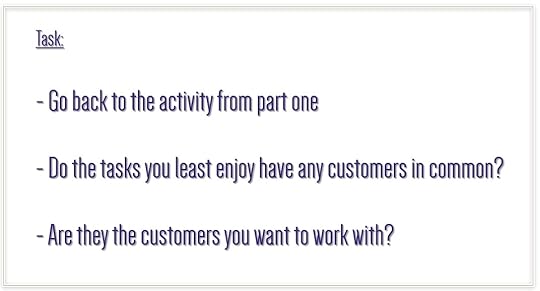
If the answer is YES:
Consider no longer offering those services. Complete any exitising contracts and stop actively selling those products or services.
If the answer is NO:
You need to conduct some research with both good and bad customers and find out what motivates them to buy that product or service.
So, when do you decide what your niche is, and should that be from day one?
This is a BIG question!
When you start your business, you need to have at least a vague idea of who you serve, otherwise, what’s the point?

It’s sensible to carry out thorough and in-depth ‘Market Research’ before starting a business. And I don’t mean paying some agency to give you lots of figures and stats, there is so much more to it than that!
You’ll have your own experience and anecdotal evidence to draw from, but don’t be fooled into believing this will be enough.
You need to talk to people, test things out, read up extensively on your topic and your sector, have an idea of who your competitors are and what they do well, and not so well, so you can position yourself differently.
You can do all the studying, reading, questionnaires and surveys you want, but the only way you’ll ever know what will work and what won’t is to do it!
Only when to you start trading will you start to understand the nuances of different potential customers and their associated marketing techniques and you can adapt accordingly.
Use Blogging To Explore Your Ideas and Test Your Market
Exploring ideas publicly on your blog is a great way to get some direct feedback from your potential customers.
You can ask questions in the content itself, or you can test what appeals to people by producing a variety of content in your blog.
Write some short articles, some long, include videos, images, audio. Use the analytics to see what blogs are proving to be popular, but also track your Social Media likes, shares and comments. This will give you a flavour of popular content, so you can produce more of that and less of the content that doesn’t engage or appeal.
All research really is, is learning through doing, testing and trying things out. Your blog is a transparent way to do it.
Missed part one? Find it HERE
For instant updates when I publish a new blog post, Follow me on Bloglovin’
For extra goodies and exclusive new information, join my mailing list HERE.
I only send a newsletter monthly so I won’t spam you, I promise!
The post How Niche Is Too Niche? Part Two: How and When to Define Your Niche appeared first on Amy Morse.
June 28, 2018
How Niche Is Too Niche? Part One: Why Should You Care?
All the advice tells us we should niche our business. But what does that actually mean?
I have a lot to say on this topic, and so I don’t overwhlem you, I’m splitting it into two blogs. This is part one!
Entrepreneur.com defines niche as:
Definition: A portion of a market that you’ve identified as having some special characteristic and that’s worth marketing to.
While I don’t disagree, does focusing on a strict niche apply in all instances?
Before you write anything, you need to know who’s reading it, so you can adapt the content and langauge accordingly. But this applies to all parts of your business – blogging for your business is onfundamental tool in your marketing toolbox.

Firstly, what are the advantages of having a clear niche for your business?
There are three big, compelling reasons to take the idea of focussing on a niche seriously…
1) Who is the Number One Fan of Your Business?
It’s much easier to talk to ‘one person’ than shout to a crowd. We all prefer individual conversations, and no one likes a shouter!
When you have a clear idea in your mind’s eye of who the ONE person is that will love what you do, you can gear all of your marketing around them. Your blogs and other marketing messages will feel to that person that they are speaking directly to them. They’ll love you, and bring their ‘tribe’ with them.

2) Avoid Confusion.
When I first started my business, I found myself standing up at networking events and saying “I do this, and I do this, and I do this, and, and…”
People were confused.

I got bad referrals and felt I had to follow them up – because I was new, I needed to get some capital behind me and get myself out there – even though, in my heart of hearts, I knew they’d be trouble!
In 2016 I accrued over a grand’s worth of unpaid invoices, each for small amounts – a tenner here and there – those small amounts were of no value to those people, it didn’t matter to them – but they soon added up for me!
I wasted so much time chasing these it was soul destroying. Happily, I eventually cleared those bad debts, but never again!
I still don’t have my pitch right. I still tell people “I don’t do copywriting”, but I’m slowly getting there.

People are getting to know me as the Blogs and Books lady.
I’m seeing much more appropriate clients for what I do, and people that I want to work with, rather than feeling I ‘have to’ work with them!
I still do lots of bits and bobs for my ongoing clients, but I don’t splurge it all out in a 60-second pitch from day one anymore!
The more specific and concise you are about what you do, why you do it and who you do it for, the more successful you’ll be!
3) Save Time and Money
If you’re spending all your time trying to tell too many people about too many things, when will you actually deliver on those promises or follow up leads?
You’ll find yourself paying out for advertising and professional services and getting little return on that investment.
All extremely compelling and sensible reasons to have a niche for your business…
However, how and when do you decide on your niche?
Should you have a niche from day one in your business?
That’s the topic for part two…
But in the meantime, here’s a short activity to get you thinking:
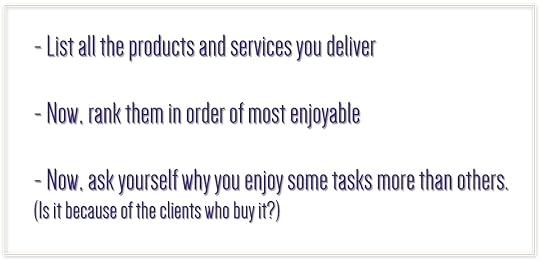 Food for throught…
Food for throught…
For instant updates when I publish a new blog post, Follow me on Bloglovin’
For extra goodies and exclusive new information, join my mailing list HERE.
I only send a newsletter monthly so I won’t spam you, I promise!
The post How Niche Is Too Niche? Part One: Why Should You Care? appeared first on Amy Morse.
June 20, 2018
How Blogging Leads to Continuous Professional Development

Working for yourself is a continuous learning journey, we learn and pick up new skills, throughout the life of our businesses, often without even realising it.
Are you actively investing in your own continuous professional development?
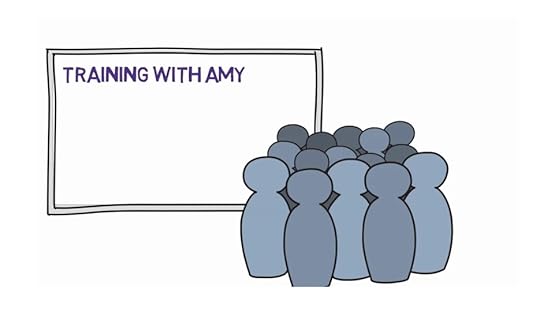
In the workplace, we rely on our employers to give us the training we need. During the course of our jobs, we come across things we don’t know enough about, gaps in our skills or new skill requirements as the nature of our roles change.
We ask the boss for the training we need, and may or may not get it.
Any half decent employer will recognise the need to invest in the development of their staff. They will budget for it. Those that don’t, will quickly lose their most capable and ambitious staff to employers that will invest in developing them!
A business ignores the training needs of their staff at their peril!
But, when we run our own businesses, we often neglect ourselves. Instead, we choose to invest in other assets, perhaps outsourcing work, or more often than not, we muddle along inefficiently because we ‘can’t afford’ to do anything else.
I refer you to the previous statement: “A business ignores the training needs of their staff at their peril!”

In this case, YOU are the ‘staff’ – ignore your own needs and you do so at your peril!
Investment in YOU is an investment in the business.
Writing is one of those skill areas we take for granted and overlook. We’ve been writing since primary school, we’re used to doing it without giving it a second thought. But ask yourself, when was the last time you got some professional feedback on your writing?
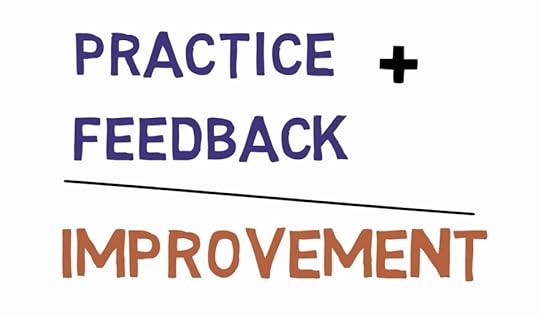
But My Writing is OK, Surely That Will Do?
Will it? Do you want your business to be seen as just ‘OK’?
Or do you want it to be held in high regard?
Do you want your personal brand to be mediocre, or do you want it to shine?
Surely it’s better to be memorable (for the right reasons)?
What you write on your blogs is often the first contact a potential customer will have with your business.
They may be looking for a service such as yours, so they search online, do some Social Media stalking, and make a decision on whether or not they take your business seriously, based on what they read.
But I Have a Degree, I’m Quite Capable of Writing a Blog!
Are you? Writing academically is a very different skill to writing a blog!
Why do you think you don’t see academic papers shared widely on Social Media? It’s nothing to do with the value of the information, it’s all in the flourish. It’s all in the presentation.
A blog is conversational. It conveys emotion, passion, opinion, entertainment. A blog tells a story.
How Does Blogging Help?
Creating healthy writing routines, getting feedback, testing your audience and exploring ideas are all development tools your blog provides.
Watch the reply of the ‘Blogging for Continuous Professional Development‘ webinar here for more top tips to invest in your own Continuous Professional Development by blogging.
For instant updates when I publish a new blog post, Follow me on Bloglovin’
For extra goodies and exclusive new information, join my mailing list HERE.
I only send a newsletter monthly so I won’t spam you, I promise!
The post How Blogging Leads to Continuous Professional Development appeared first on Amy Morse.
June 15, 2018
The AIDA Blog Structure
Like it or not, we are creatures of habit and routine. To varying degrees, we want structure and order in our lives to thrive.
When you run your own business, orderly systems and processes will keep you on track, allow you to capitalise on opportunities and ultimately help you to achieve your goals.
(Sometimes an orderly business can feel like the Holy Grail, however!)
When it comes to writing blogs, especially when you are new to the process, it can be easier to follow a set formula, a structure that will maximise the value that content adds to your business.

So, how do you structure a blog post?
As an author, I will always advocate a storytelling approach.
With 60% of the blog being narrative and 40% factual.
Let’s break that down into a neat structure…
Who’s AIDA, Anyway?
AIDA is an acronym that means: Awareness, Interest, Desire, Action.
First attributed to American advertising and sales pioneer, E St. Elmo Lewis, in the 19th century, it maps the basic steps prospective customers take to make a purchase. Still used widely today, there are variations of the model, but it remains relevant as a starting point for businesses to convert their messaging into sales.
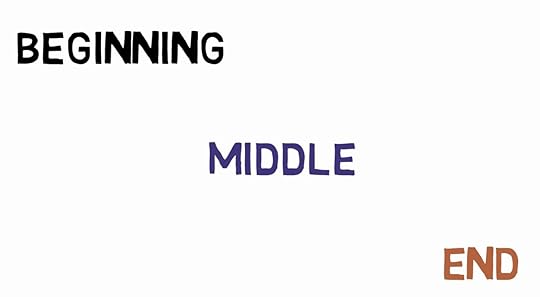
Beginning
… a very good place to start!
Have a clear beginning, middle and end.
Sprinkle your narrative 60% evenly across the three sections (20% in each segment)
The beginning is where ‘Awareness’ comes in.
Awareness starts with an attention-grabbing headline
You then need to peek their ‘Interest’ by ensuring the blog is laid out in a way that is appealing, easy to consume and readable.
The opening paragraph needs to hook them in. Share an anecdote. Give them something or someone to empathize with. Introduce your central character (i.e. is it you and your experience? Is it them? Is it someone else?)
Middle
Now you’ve got them interested you want them to keep reading. They need to be able to get something of value from the content to have the ‘desire’ to read on.
Is it purely to entertain?
Perhaps it’s educational in some way?
What relevant problem are you tackling, and what solution are you offering?
Break up the writing with plenty of white space.
Have bullet points, where appropriate…
and subheadings…
…so they can find the information they want quickly and simply.
Make sure it’s well written and proofread, so they are left satisfied, and not put off by the quality (you don’t want to be remembered for the wrong reasons!).
End
They need somewhere to go to next. Don’t lead them into a dead end!

Have a call to ‘action’. This could be a link to the newsletter, an event, a product etc.
It could also include cross links to other blogs for further reading, or to other websites for more information. This not only helps them navigate around your website, therefore ‘browsing your shop’ a little longer, it also helps Google to crawl your content when potential readers type in search terms (SEO: Search Engine Optimization).
With a structure in place to keep your blogs effective and consistent, at least you can confidently take one step closer to that Holy Grail of an orderly business!
Happy Blogging, with #AmyQuenOfBlogs…
For a detailed breakdown to use as a checklist for your own blogs, download the ‘AIDA Blog Structure Template’ HERE:

For instant updates when I publish a new blog post, Follow me on Bloglovin’
For extra goodies and exclusive new information, join my mailing list HERE.
I only send a newsletter monthly so I won’t spam you, I promise!
The post The AIDA Blog Structure appeared first on Amy Morse.




